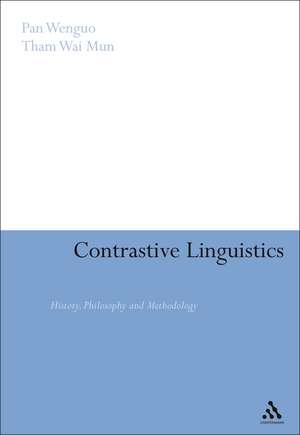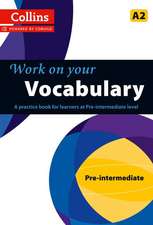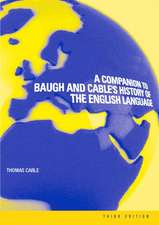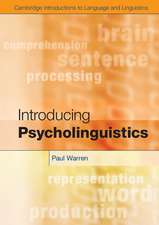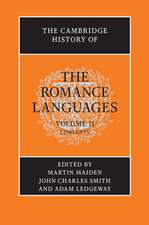Contrastive Linguistics: History, Philosophy and Methodology
Autor Pan Wenguo, Tham Wai Munen Limba Engleză Hardback – 9 mai 2007
| Toate formatele și edițiile | Preț | Express |
|---|---|---|
| Paperback (1) | 258.69 lei 6-8 săpt. | |
| Bloomsbury Publishing – 16 iul 2014 | 258.69 lei 6-8 săpt. | |
| Hardback (1) | 1155.03 lei 6-8 săpt. | |
| Bloomsbury Publishing – 9 mai 2007 | 1155.03 lei 6-8 săpt. |
Preț: 1155.03 lei
Preț vechi: 1481.09 lei
-22% Nou
Puncte Express: 1733
Preț estimativ în valută:
221.08€ • 240.23$ • 185.83£
221.08€ • 240.23$ • 185.83£
Carte tipărită la comandă
Livrare economică 22 aprilie-06 mai
Preluare comenzi: 021 569.72.76
Specificații
ISBN-13: 9780826486349
ISBN-10: 0826486347
Pagini: 304
Dimensiuni: 156 x 234 x 18 mm
Greutate: 0.59 kg
Editura: Bloomsbury Publishing
Colecția Continuum
Locul publicării:London, United Kingdom
ISBN-10: 0826486347
Pagini: 304
Dimensiuni: 156 x 234 x 18 mm
Greutate: 0.59 kg
Editura: Bloomsbury Publishing
Colecția Continuum
Locul publicării:London, United Kingdom
Caracteristici
First book written by a linguist from mainland China on this subject and shows what Chinese scholars have to say about the nature of their language
Notă biografică
Professor Pan Wenguo is at East China Normal University. He has published widely on contrastive linguistics and translation studies including An Outline of Contrastive Study between Chinese and English (Beijing, 2003: BLCU Press). Tham Wai Mun is Assistant Professor in the Division of Chinese, Nanyang Technological University, Singapore.
Cuprins
Introduction1. The Development of Contrastive Studies in the West: From Humboldt to the present2. Contrastive Studies in China (1898-1955)3. Contrastive Studies in China (1956-present)4. Nature and Scope of Contrastive Linguistics5. Methodological ConsiderationsConclusionBibliographyIndex
Recenzii
Overall, the book is the first attempt to bring history, philosophy and methodology together to broaden the view of contrastive linguistics... Besides the academic merit, commendably, it is also the first time that Chinese scholars have presented achievements in contrastive linguistics research to the world through their careful observation, diligent thought and lucid exposition.
The present volume stands out as one of the most comprehensive surveys of the history of contrastive linguistics, quite possibly the most comprehensive one published to date. The width and depth of Pan and Tham's knowledge and understanding of the theoretical and methodological issues associated with contrastive linguistics scholarship on a global scale is nothing short of astonishing and truly praiseworthy. Such a volume was no doubt long overdue, but the fact that it appeared in 2007, the year in which contrastivists the world over celebrated the 50th anniversary of the publication of the charter of contrastive linguistics, Lado's Linguistics across cultures, is eminently significant. It is a momentous occasion for all involved in contrastive linguistics research to reflect upon the results obtained through the implementation of various models of contrastive analysis, observe them and reinterpret in a wider context, get a better, more profound grasp of the full potential of the discipline and reaffirm their commitment to carry on further research. Contrastive Linguistics: history, philosophy and methodology is not only an indispensable reference tool to a range of specialists - theoretical and applied linguists of various provenance - but also a valuable contribution to the modern history of language research. The authors should be congratulated on a truly remarkable achievement, persuasively reinstating the relevance of contrastive analysis and its theoretical and methodological apparatus within present-day linguistics.
The present volume stands out as one of the most comprehensive surveys of the history of contrastive linguistics, quite possibly the most comprehensive one published to date. The width and depth of Pan and Tham's knowledge and understanding of the theoretical and methodological issues associated with contrastive linguistics scholarship on a global scale is nothing short of astonishing and truly praiseworthy. Such a volume was no doubt long overdue, but the fact that it appeared in 2007, the year in which contrastivists the world over celebrated the 50th anniversary of the publication of the charter of contrastive linguistics, Lado's Linguistics across cultures, is eminently significant. It is a momentous occasion for all involved in contrastive linguistics research to reflect upon the results obtained through the implementation of various models of contrastive analysis, observe them and reinterpret in a wider context, get a better, more profound grasp of the full potential of the discipline and reaffirm their commitment to carry on further research. Contrastive Linguistics: history, philosophy and methodology is not only an indispensable reference tool to a range of specialists - theoretical and applied linguists of various provenance - but also a valuable contribution to the modern history of language research. The authors should be congratulated on a truly remarkable achievement, persuasively reinstating the relevance of contrastive analysis and its theoretical and methodological apparatus within present-day linguistics.
